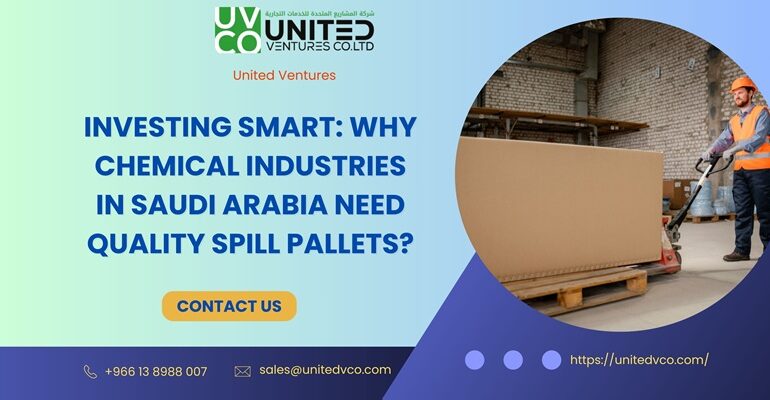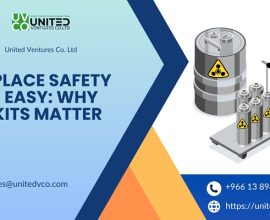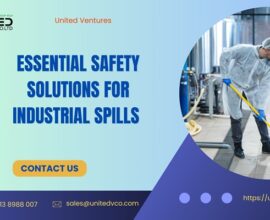In Saudi Arabia’s fast-growing chemical sector, safety isn’t just a regulation—it’s a responsibility. From oil refineries to chemical processing plants, one small leak can cause massive environmental and financial damage. That’s why investing in a reliable Spill Pallet isn’t an expense—it’s a long-term safety investment.
The Real Cost of Ignoring Spill Containment
Let’s be honest—many facilities still underestimate the cost of a chemical spill. A minor leak of even a few liters can contaminate soil, halt production, and attract regulatory fines. According to a report by the U.S. Environmental Protection Agency (EPA), cleanup and damage control after a spill can cost up to 30 times more than preventive measures. For Saudi industries handling oils, acids, or hazardous liquids, prevention truly is cheaper than cure.
What Makes a High-Quality Spill Pallet Worth the Investment?
Not all pallets are made equal. A high-quality Spill Pallet is designed to do more than just hold containers—it ensures that leaks, drips, and overflows never reach the ground or drains. Here’s what makes them invaluable:
- Durability Under Pressure: Premium-grade pallets are made from high-density polyethylene (HDPE), which resists corrosion, UV rays, and harsh chemicals commonly found in Saudi industrial environments.
- Compliance and Safety: They meet global standards like EPA and ISO 14001, which can help industries maintain environmental compliance and reduce insurance liabilities.
- Custom Capacity: Whether storing a few drums or an entire chemical batch, modern designs offer modular scalability to suit any facility layout.
Why Saudi Arabia’s Chemical Industry Needs Spill-Ready Infrastructure?
Saudi Arabia is home to some of the world’s largest petrochemical and manufacturing plants. As the Kingdom moves towards Vision 2030, industrial safety and sustainability have taken center stage. Companies are now expected to not only meet but exceed international environmental standards.
High-quality spill containment systems—including pallets and Spill Kit Wholesale options—support this vision by ensuring efficient handling, safer workspaces, and minimized contamination risks.
Key Benefits for Saudi Chemical Companies
- Regulatory Compliance: With increasing emphasis on sustainability, the Saudi Standards, Metrology and Quality Organization (SASO) encourages chemical firms to follow spill containment guidelines.
- Reduced Environmental Impact: Preventing hazardous leaks helps protect soil and groundwater around industrial zones like Jubail and Yanbu.
- Enhanced Workplace Safety: Proper spill management reduces employee exposure to harmful chemicals and prevents costly downtime.
How to Choose the Right Spill Pallet?
Selecting the right model depends on your operations. Here’s a quick guide for decision-makers:
- Material Compatibility: Choose pallets resistant to the chemicals you store—HDPE works best for acids and bases, while galvanized steel suits oils and fuels.
- Load Capacity: Always check the sump volume; it should hold at least 110% of your largest container’s capacity.
- Design Efficiency: Modular designs allow easy movement with forklifts, ensuring flexibility in fast-paced Saudi facilities.
Pro Tip:
Invest in a spill containment system that integrates easily with your existing storage racks or transport units. In a region with high temperatures like Saudi Arabia, UV-resistant pallets also ensure long-term reliability.
Frequently Asked Questions
1. Are spill pallets mandatory for chemical industries in Saudi Arabia?
While not explicitly mandated in every case, Saudi environmental and industrial safety standards strongly recommend their use to ensure compliance and prevent contamination.
2. What capacity of spill pallet is best for a medium-scale chemical plant?
For most medium-sized facilities, 4-drum or 8-drum spill pallets offer an ideal balance of capacity, mobility, and containment efficiency.
3. How often should spill pallets be inspected?
Experts suggest monthly visual inspections and quarterly load tests to ensure integrity, especially in high-temperature regions.
4. Can spill pallets handle corrosive liquids?
Yes, HDPE spill pallets are specifically engineered to resist corrosion and chemical degradation from acids, alkalis, and solvents.
Final Thoughts
Investing in quality spill pallets isn’t just about compliance—it’s about building a culture of safety and responsibility. For Saudi Arabia’s chemical industries aiming to lead in sustainable growth, choosing reliable containment systems today prevents environmental and financial setbacks tomorrow. When it comes to industrial safety, quality truly pays off.




